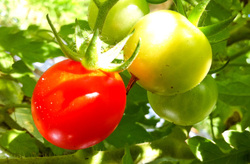 The tomatoes are here, soon to be in quantity The tomatoes are here, soon to be in quantity (FREDERIKSTED) THE NOVEMBER & DECEMBER RAINS made annual crop planting tricky this year for all the farmers on St. Croix, particularly on the rainy western end. While the tropical seasonings, greens, and fruits have faired quite well, the more tender types have proven less vigorous in the harsher than normal conditions. Yet despite the challenges, Ridge to Reef Farm in the "rainforest" of Frederiksted, who is the USVI's USDA certified organic farm, was buoyed by a strategy of production diversity and is now seeing an explosion of new "favorite" crops entering the market successively, starting this week. Many of our fellow farmers on St. Croix have reported some heartbreaking stories of complete losses on early planted tomatoes, cucumbers, and other crops that are typically suited for temperate environments and were beaten down early. Sweet potatoes and other leafy crops also have taken a hit, first from the constantly saturating record-setting rain, and then the subsequent population booms of aphids and caterpillars which laid many salad and greens fields to waste -despite the best in organic defense methods. While these products are slower to come this year, R2R and other farms have been dutifully planting successive sets of crops that are now coming strong to fruition as the more standard winter season weather has set in over our farmlands. Fortunately, R2R waited for proper soil moisture to prepare fields after the rains, which resulted in few direct losses from rain but added a 2-3 week delay to some of the more favored crop plantings. The first few weeks of the 2014 Winter Virgin Island CSA season featured hearty annuals such as large bok choy, eggplants, kale, radishes, peppers, various herbs, sorrel (roselle), basils, and more. These first shares were bolstered by the reliable regional tropical plants, such as the ever-popular moringa leaves and flowers, chaya, culantro, lemongrass, sour oranges, bananas, dwarf coconuts, and nopales. Thanks to our diverse planting strategy, there still was an abundance of choice high-quality certified organic food to provide the membership, despite the mainstay annual crop delays. It pointed to the successful support net of interplanting using a wide range of crops verses mono cropping, which can be more profitable but with less overall stability in times of flood, drought, or infestation. CSA programs are often successful because long seasons allow farmers to share with their members according to the fluctuation of crops as they ebb and flow throughout the season. The shared-risk agreement taken on by farm share members gives a farmer a supportive chance when disaster strikes, which does not have to be a hurricane to result in total losses -it could be a tiny bug the size of a period. This helps the consumer maintain a supply of organic produce, since CSA's commonly use multi-cropping strategies that have a lower profit margin but higher stability in constant food provision for a local community. Fortunately, for both farmers and CSA members, the length of the season (ours are 14 weeks for 3 seasons) gives the farmer a chance to "pay it back" over an average of weeks throughout the season if boxes are slimmer or more tropical during certain annual crop gaps, which are bound to occur for a farm delivering a high-quality CSA for many weeks of the year. To that end, Ridge to Reef Farm has one of the longest CSA programs on the planet, including 42 weeks of delivery for 2014 to over 100 members. The CSA has grown 300% in the past 3 years. This is all driving towards the R2R goal to feed 1% of the USVI population with USDA certified and inspected local, organic food, which is not available at any other farm or outlet in the entire United States Virgin Islands. Now available on all three islands, the continued growth of R2R is mostly due to the heart and dedication of the CSA members and the Ridge to Reef Farm Crew, who are making tremendous moves despite a set of challenges that in part explains the dearth of local organic food in the USVI. First picks of these specialty organic seed crops go to the VI-CSA, which serves weekly vegetable and fruit boxes on St. Croix, St. John, and St. Thomas. After the boxes are full, additional top grade produce overflows into our www.vi.locallygrown.net market and some will be featured at this week's Virgin Island Agricluture and Food Fair (Feb 15-17). Now, Ridge to Reef is pleased to soon be providing many of the most loved temperate annual crops, such as the famous heirloom open-pollinated tomatoes, who are showing off their amazing colors and vine ripening like a slow motion firework display. I took a deer's eye walk on Friday and shot a few photos for you to feast on.... while the full-on ripening starts! THANK YOU ALL for supporting Ridge to Reef Farm and local certified organic produce in the USVI! And thank you to our staff past and current who makes it all work. Please, enjoy the photos and of course your food here that is being grown for YOU. Better yet, give us a visit in person and volunteer! It's not enough to KNOW... you got to GROW!! In love, peace, & shared abundance, Nate Nate Olive Director Ridge to Reef Farm
2 Comments
 Past student of the Ridge to Reef Beneficial Farmer Training program, Daniel "Dinakar", has help spread seeds of compassion in promoting a high-nutrient food supply and viable crop of Moringa oleifera to Burnika Faso, west Africa. His project for the course included the design and building of a minimal-input dry garden, which he learned to develop in order to assist his non-profit's work. In it, he planted moringa, cassava, yams, and other crops suited for the situation. Nearly 4 years ago and with no care or maintenance other than an occasional weeding, Daniel's project here in Pleasant Vale still grows today. You can help Daniel see that his work in Burkina Faso also lives on. As he ends his volunteer work period there, he is fundraising to see that it may continue into the future without him. Take a look at his project video, and please consider visiting his crowdsourcing fundraising page to help keep the project active. 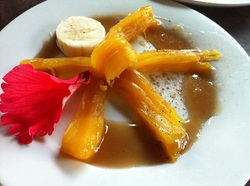 From last night's "Feed the Farmer Chef Challenge", coorporate team building event, at Ridge to Reef Farm with the administrative staff of Diageo, the makers of Captain Morgan rum and many other brands. Their team rolled up their sleeves, harvested, prepped, and created a fabulous dinner along with our chefs, Jamison Pollitt and Tahirah Abubakr. Two teams competed, and it went down to the wire with the judges. This was my favorite dish, super ripe jackfruit with hibiscus and banana, accompanied with Captain Morgans spiced rum reduction sauce. They also came up with a clever name for the dish, Captain Jack! It won first place, could be a Taste of stx entry one day, hmmmm? Big thanks to the judges Shelli Brin-Olive and Dakota Breveridge. Also, Jillian Biggerstaff was an amazing referee and set up most of the event with a TV production quality. In all, it was a great mingle for two of St. Croix's highest quality food and beverage companies... If anyone else wants to do a Team Building event, contact us.  Farm resident Jamison forwarded me this all-too-accurate comical description of the hidden side of living on a farm, especially with animals involved. From one of the most revered and accurate news sources on the planet, CRACKED. Of course, we love and treat our animals like family here, but also love the inherent comical side for them too. Watching sheep ride each other while being herded or a cattle egret take a dump on a donkey's back must have been part of the selective breeding process gifted from our forward-looking ancestors. After all, what is life without laughter? We send thanks to the animals for cracking us up, and lightening the stress of farming! read the 6 things here (caution, sudden explicit language involved, something no one tells you about) http://www.cracked.com/blog/6-things-no-one-tells-you-about-living-farm/ 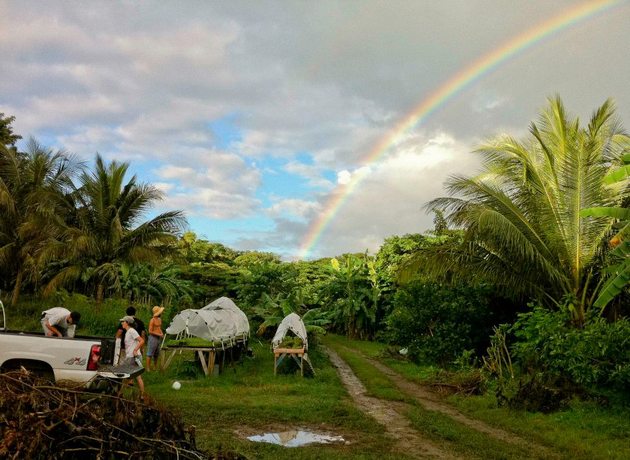 THE FARM FEELS GOOD. We were delivered a nice rainy week and now back to drier winds. The fall season is slipping into the december transition time before winter season. It is so fitting, to be this week. At the start of this week, I drove down in my truck to where everyone was carrying out transplants when they showed me the rainbow on the northwest sky. It was as if the rain was on its edge, the leaving time. It also felt like a time of return. It felt like a visit from an old friend, a young spirit. Those of us who knew what it meant glanced at each other with knowing smiles before looking back to the sky. Here we were, a year from when this garden was planted with sunflowers, days before we would lose the young woman who lived in the bamboo grove behind what we now call, "Ellen's Garden." This week the emotions are in every move I make. I still shudder and realize my denial against the pain of loss and the real fact that she is gone, from a bright light, exactly like the sunflowers she planted, to ... some state i still don't understand. Last year at the same time we were doing the same thing we are doing right now. We were planting for our first season of the CSA. In all that hope that comes with planting food, all that beauty of the green extensions and the varied petals with their colors, we experienced that loss that I will never forget. Last year we dedicated our 2012 CSA season, the first full-year CSA ever offered in the USVI, to the life and spirit Ellen Nettles. She was a young intern who was wildly passionate about local organic food. When I say she was a bright light I am not doing her justice. She was radiant in everything she did, and made local organic food her goal in life to live and learn. And to share. And share she did. Much of the food this year came from her plantings. In fact, her basil plants are still growing! At times, the CSA has not been all zinnias. There have been struggles, like the daily ones with the pests and diseases in the gardens, and others like interpersonal conflicts that come from living, working, and doing everything together like we do here at the farm with most of our staff. We have had floods, and then droughts. We've had sheep eat our greens, and dogs eat our sheep. We have been scraping by, yet surviving, financially, for the long fall months without our supplemental tourism income and most difficult growing season. But through it all, in times like this, I get to see through a prism sometimes that reminds me of our friend, our sister, our inspiration -Ellen. It is that sign that we saw beaming out of the tide pools the day after. It was the one that arched over the Gaia garden last year while we hugged Ellen's father and sister in the rain. It seems it has been there every time I hear her name. It always brings us back together. Usually not a moment too late. When we see the rainbows we here reconnect on that basic human level for tolerance, mutual support, and love. It is the spirit of unity. It is the very essence of why we grow food for a living. Even further, it is why there is living. At least for me, that is the case. You are beautiful, my friend. You are still here with us, our sister. The seeds that you have sewn reached over 76 CSA unique subscribers and more than 100 shares over 3 seasons in one year! We had that goal as our team here, and we succeeded. One year ago, we only had seeds and a lot of hope, fueled with a level of passion that you were known for. Today, we have seedlings in the ground and hope arching over us. With this coming year we will again grow to new levels, while we and the plants reach up to the sky. Yes, the farm really does feel good right now. It's getting windy again. The air is sweet with something I remember. But I can't put my finger on it. To our island community taking part in our dream to supply local organic food to 1% of the USVI: Thank you for being our success. I know Ellen is very proud of our achievement. Nate 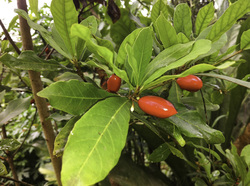 Sometimes right when you need it a little magic berry appears and turns everything sour into sweet. A couple weeks ago, right as Tropical Storm Isaac pushed some windy rain across the island, this rare and fleeting miracle fruit appeared. We got 3 inches of rain that week which made the valley an even darker green than normal. It made the berries pop with their deep dark red, a color my iPhone could not match as you can imagine looking to the left at this picture I snapped. Today, right after the next rain since Isaac, already a dusty memory from weeks ago, another miracle bush fruited in a fury. I am hoping we will have enough to share with our CSA members! This fruit is tricky to time, and difficult to preserve and ship! I guess some times you have to put yourself in the right place at the right time for miracles to happen. Read the New York Times' article about "flavor trip parties" with the miracle fruit, something New York wishes they could grow! 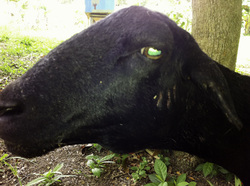 Our recent days of joy with the four newborn lambs and dutiful mothers ended abruptly with a saddening 6am phone call. Patrick's words hid hard, "The black mother sheep is standing in the bathroom stall. She is bleeding badly. It looks like dogs." "I'm on my way," I replied. As I put on my shoes and clothes, shuffling out the door I was hit with the realization that we probably lost all the new lambs and probably their mothers too. These mothers were so instinctual they would probably not leave their lambs in the face of danger. I had let them stay outside the main pen since they gave birth and were sticking to a single out-of-the-way spot, and was just ready to more them in to socialize with the herd. We have not seen roaming dogs or tracks in a long time, but obviously I waited a day too long. I feel awful what happened to them. And responsible. The picture above is Martha, the one found in the bathroom. Martha was a model mother of her lambs and consistent breeder. This image shows one side of teeth marks on her jaw. Her neck was punctured and she was choking on her own blood. Her back leg was so badly ripped apart that I decided not to put the images on our website. Unfortunately, we had to put her out of her misery. She was not going to live. While I would have preferred to honor the animal by using every part, her massive internal bleeding made the carcass almost completely tainted. Two dogs did this, for sport. They just killed them one by one, without eating them. Looking at the tracks I judged there were two dogs, one very large and powerful with big jaws and the other medium sized who was the follower. They snuck across the farm before the sun rose Sunday morning and made their attack after finding these in their tuck-away area behind a farm house. I found two baby lambs, brother and sister kids of the white ewe, dead on the ground laying peacfully as if they were both simply asleep. The other mother had many bites, but we administered antibiotics and washed her wounds. Miraculously, a third lamb appeared out of the bush, who Shelli found and we rounded her up to safety. The fourth lamb is still unaccounted. We are reeling from the tragic loss of these sheep and seeking for the owner of a large Rottweiler with a red collar, as our neighbor said a horse was attacked the day before just on property over by such a dog. Until then, no animals of ours our allowed out of their enclosures! 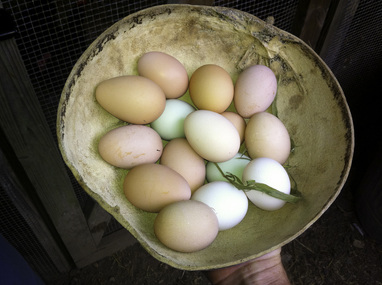 These are just a few of our chicken eggs that I retrieved yesterday from one of the coops at the farm. It struck me how beautiful these are. It's like every day is Easter! The wonderful thing about these, other than the dark yolks and size, is that we can know which chicken laid them (or at least narrow the options), because each will lay the same color eggs every time. We have a continual struggle with the mongoose 'dem, who apparently love them just as much as we do. They get their fair share, but that is a story for later. The bowl holding them is a calabash cut in half and cleaned a a part of our summer camp, led by my lovely wife, Shelli. As blueberry farmer Jim says back in my home state, "It's just another Ho-Hum Day in Paradise!" |
AuthorNate Olive is the Director of Ridge to Reef Farm at VISFI Archives
February 2014
Categories
All
|
|
All Content Copyright 2023-2024
PO Box 2903 #1 Ridge to Reef Farm Rd, Frederiksted, St. Croix, USVI 00840 www.ridge2reef.org Contact: [email protected] 340.473.1557 |
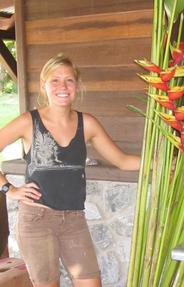
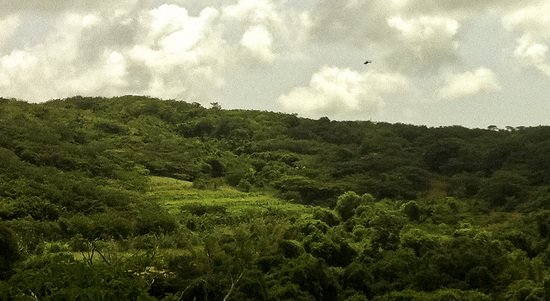
 RSS Feed
RSS Feed
